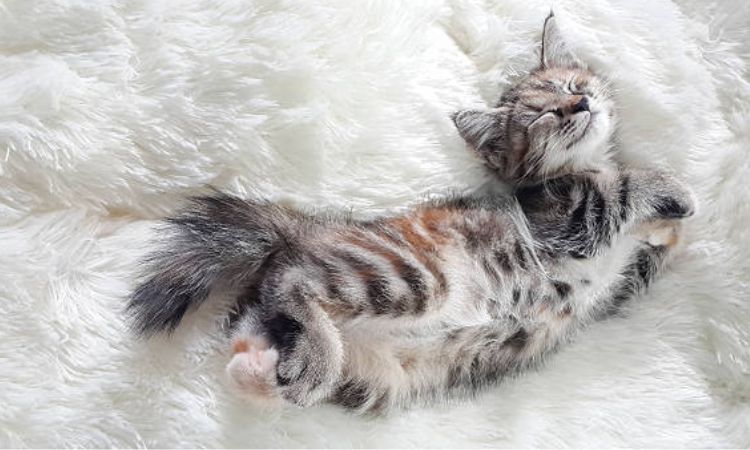Bringing a new kitten home is like inviting a tiny whirlwind of curiosity, energy, and whiskers into your life. As adorable as their daytime antics are, nighttime can quickly become a test of patience if your little furball isn’t ready to settle down.
With a few simple routines, cozy nooks, and a sprinkle of patience, you can help your kitten trade midnight zoomies for peaceful, purring slumber—and finally enjoy a quiet night together.

Create a Comfortable Sleeping Environment
Setting up a safe and cozy sleeping space is key to helping your kitten feel secure and relaxed. A well-prepared environment can make the transition to their new home smoother and encourage better sleep patterns from the start.
- Warm and quiet: Choose a spot away from drafts, household noise, and heavy foot traffic so your kitten can rest undisturbed.
- Comfy bed: A soft bed with high sides provides a snug, protected feeling, mimicking the comfort of a mother’s embrace.
- Familiar scents: Adding a blanket, toy, or piece of clothing your kitten already knows helps them feel safe and reduces anxiety.
- Elevated or nearby: For the first few nights, an elevated spot or a bed close to you can offer reassurance while they adjust to the new surroundings.
- Gentle lighting: Keep the sleeping area dim, or use a soft night light to ease your kitten’s adjustment, helping them feel secure without startling them in the dark.
Creating this kind of environment not only supports your kitten’s natural need for warmth and safety but also sets the stage for healthy sleep habits as they grow.
Establish a Consistent Bedtime Routine
Creating a predictable bedtime routine is essential for helping your kitten sleep soundly through the night. Just like humans, kittens thrive on consistency, and a regular schedule signals to them when it’s time to wind down.
- Maintain a consistent schedule: Try to feed, play, and put your kitten to bed at roughly the same times each day. This helps regulate their internal clock and reduces nighttime restlessness.
- Pre-bedtime play: Engage your kitten in an energetic play session before bedtime. Toys that mimic hunting, like strings or balls, help them expend excess energy and transition more easily into sleep.
- Small evening meal: Offering a light meal or treat right before bed can encourage your kitten to settle down afterward. The post-meal relaxation mimics natural feline patterns, making them more likely to snooze peacefully.
By keeping a consistent routine, your kitten will learn what to expect each night, making bedtime smoother for both of you and encouraging healthy, long-lasting sleep habits.

Provide Adequate Daytime Exercise and Mental Stimulation
Keeping your kitten active and mentally engaged during the day is key to helping her sleep well at night. Kittens have bursts of energy that need an outlet, and without enough stimulation, they may wake you up with nighttime zoomies.
- Interactive Play: Set aside time each day for active play sessions. Toys that mimic hunting, such as strings, balls, or small plush mice, help your kitten exercise both her body and natural instincts.
- Rotate Toys Regularly: Introducing new toys or rotating existing ones keeps playtime exciting and prevents boredom. Puzzle toys that dispense treats are especially effective, offering both physical and mental challenges that tire her out.
Providing scratching posts, cat trees, or shelves allows your kitten to stretch, scratch, and explore safely. These activities not only maintain healthy claws and muscles but also help burn off excess energy before bedtime.
Encourage Independence in Sleeping
Helping your kitten learn to sleep on her own sets the foundation for peaceful nights—for both of you!
- Set Up a Cozy, Separate Bed: Give your kitten her own safe and warm spot to sleep. Add soft blankets and a favorite toy so she feels secure and comfortable.
- Hold Off on Bed-Sharing: Resist the urge to let her sleep in your bed right away. Early bed-sharing can lead to nighttime disruptions and make it harder for her to develop independent sleeping habits.
- Guide, Don’t Force: If she keeps wandering into your room at night, gently close the door for short periods. This helps her get used to her own space while still having access to other safe areas in your home.
With patience and consistency, your kitten will grow confident in her own sleeping spot—meaning quieter nights and happier mornings for both of you.
Manage Nighttime Behavior

Ignore Nighttime Crying
Kittens quickly learn that meowing, pawing, or scratching can get your attention. If you respond during the night, it reinforces this behavior, making it harder for them to sleep independently. Instead, check briefly that your kitten is safe, comfortable, and has access to water and the litter tray, then calmly ignore her until morning. Consistency is crucial—over time, your kitten will understand that nighttime is for rest, not play or attention-seeking.
Use an Automatic Feeder
Early-morning waking can often be caused by hunger, especially in younger kittens with small stomachs. An automatic feeder dispenses a small portion of food at a preset time, helping your kitten feel satisfied without waking you. This is especially useful for maintaining a consistent feeding schedule and can reduce early-morning disturbances while your kitten adjusts to a new sleep routine.
Watch for Medical Issues
While many nighttime wake-ups are behavioral, persistent restlessness or excessive meowing could signal an underlying health problem. Issues such as digestive discomfort, urinary infections, or pain may prevent your kitten from sleeping through the night. If your kitten continues to wake frequently despite proper routines and care, schedule a check-up with your veterinarian to rule out any medical concerns and ensure she is healthy and comfortable.
You may be interested in: How to Get Your Cat to Sleep with You
By following these tips, you can help your new kitten transition to a nighttime routine more smoothly, ensuring they get the rest they need to grow into a healthy and happy cat. Remember, consistency is key, and with a little patience, you’ll both be on your way to a peaceful night’s sleep.






